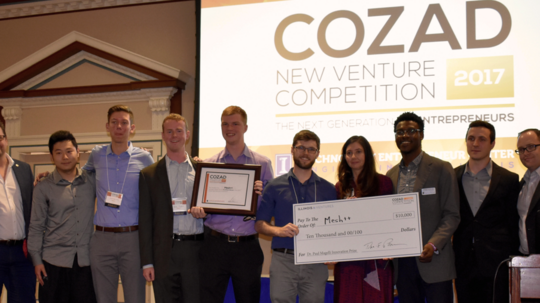
Danny Gardner was an undergraduate studying Electrical Engineering at the University of Illinois at Urbana-Champaign (UIUC) when his friend pointed out the technical and financial complexities in installing hardware systems for a service often taken for granted: WiFi in public spaces. Conducting market research in mobile-heavy demographics like Tanzania and India, a chance meeting with Chicago Mayor Rahm Emanuel showed him the potential opportunity was equally ripe in Chicago parks on the South and West sides of the city.
Launched in the spring of 2016, Gardner's company, Mesh++, is building hardware solutions in the form of solar-powered WiFi "nodes" (routers) that form a mesh-like network which are able to communicate with each other using data already stored on the devices. "Instead of using satellites to scan large areas of land, we thought: Why not bring parts of the internet that people are already using, to them directly?" said Gardner in an interview with Chicago Inno.
Mesh++ devices are able to store 16GB of data and broadcast a WiFi network all day (irrespective of availability of sunlight) up to 1,100 ft in any direction -- which is more than most routers, according to the startup. Its nodes communicate with each other wirelessly, thus easily allowing WiFi-enabled devices to access data on its network. What's more, the nodes only cost about $20 in parts and require no existing infrastructure: no electrical grid or server connected to the global internet, if you're able to upload all the data you want to provide onto the nodes. The nodes can easily be installed on top of lamp posts in traditional public spaces.
"Solar-powered WiFi isn't a new concept, but what sets us apart is our ability to work with limited infrastructure, and how we bypass the costs of traditional fiber or heavy solar panels which are also difficult to move or reinstall every time you need to reconfigure the network," said Gardner. "We are leveraging the decreasing costs of WiFi hardware and flash memory to provide better connectivity in a simple, scalable format."
What started off as a Senior Design Project hosting a few Wikipedia pages on nodes installed across the UIUC quad is now an active venture with five team members performing engineering and business development roles. A finalist at UIUC's startup competition Cozad, Mesh++ received a $10,000 investment from IllinoisVENTURES, spent the summer of 2016 on campus at the iVenture Accelerator and is currently based at mHub in Chicago. Soon, it will be relocating to Shenzhen, China, having received $175,000 in funding and a spot at Hax, the world's first and largest hardware startup accelerator.
Recently, the technical debacle of the Pokémon Go Fest occurred in Chicago, and going by Ninantic CEO's official word, service providers should have been better prepared for network congestion and oversaturation of data. Gardner hopes that pre-loading data or information onto a mesh network like Mesh++ means you don't have to rely on cellular networks as much.
Gardner met Emanuel as the Mayor took his tech talent retention effort ThinkChicago on a road trip down to Champaign and offered a chance for the startup to pilot its technology in Chicago. Looking to have a complete product by early 2018, Gardner is excited at spending the next few months in China. "We continue to believe in our technology's potential to improve educational offerings, e-commerce tools and communication infrastructure, to ultimately boost economies everywhere," concluded Gardner.








